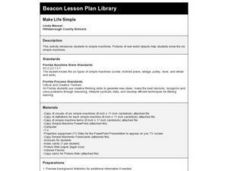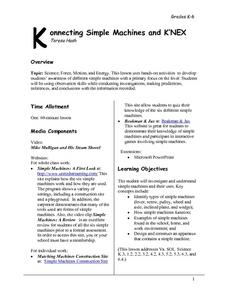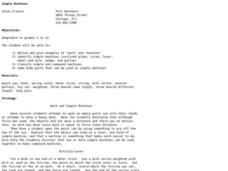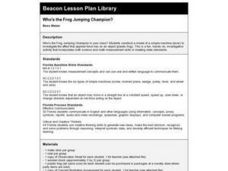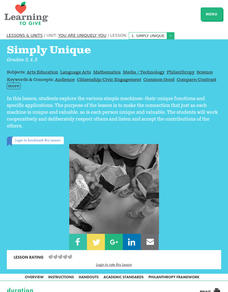Alabama Learning Exchange
Simple Machines Internet Research
Students identify six types of simple machines, then use the Internet for research.
Curated OER
Inventor's Workshop
Students explore the six simple machines that are the basis for all mechanical devices. In this physics lesson, students choose one simple machine to research and then find a complex machine it is apart of. Students examine Leonardo...
Curated OER
Backpacks and Hills
This machines PowerPoint reviews effort and force in relation to work and informs students about different types of machines and the different ways forces are applied and how they work to increase efficiency.
Curated OER
Simple Machines - Graphics, Experiments, Animation
Twelfth graders display simple machines through the use of graphics, experiments, and animation. They apply problem solving and design and skills.
Curated OER
Make Life Simple
Students examine six simple machines by looking at pictures of real world objects.
Curated OER
Konnecting Simple Machines and K'Nex
Learners study and identify different types of simple machines and how they work. They design a simple machine.
Curated OER
Force and Motion Flip Books
Fourth graders identify six simple machines in real world examples, distinguish between the three different types of levers and explain Newton's three laws of motion. They create a multimedia presentation over the information they've...
Curated OER
Pulleys
In this simple machines worksheet, students learn about pulleys. They then answer the 11 questions on the page. The answers are on the last page of the packet.
Curated OER
Simple Machines
Learners investigate what simple machines are and how they work. In this simple machine lesson, the students create simple and compound machines and test each machine's ability to perform a task. Learners compare simple machines to...
Curated OER
Forces Applied to an Object
Fourth graders predict, observe, and compare what happens when a force is applied to an object. In this forces lesson, 4th graders complete a 'swinging hammer' activity to learn about forces and motion.
Curated OER
Exploring Simple Machines
Students investigate simple machines. In this simple machines instructional activity, students study how simple machines work. Students determine the function of various simple machines.
Curated OER
Challenger's Lost Lessons - The Lost Simple Machines Lesson
Students investigate the characteristics of simple machines. In this simple machine lesson, students investigate work as a product of applying constant force. They answer questions about what happens on Earth and what may have happened...
Curated OER
Who's the Frog Jumping Champion?
Students use a simple machine (a lever) to launch a plastic frog. students determine who is able to make their frog "jump" the farthest and graph the results.
Curated OER
Simple Machines
Third graders examine and identify the six types of simple machines. Using a model of each simple machine, they demonstrate the state the function of them to the class. They discover examples of simple machines at school and home and...
Curated OER
QuickTime Science Project
Fifth graders divide into teams and select a simple science topic to explain and illustrate. They should pick a topic that they can illustrate with a very short (about 15-20 seconds) video clip, or QuickTime movie.
Curated OER
Simple Machines Vocabulary Quiz Worksheet
In this simple machines vocabulary quiz activity, students match the 19 terms in the word bank to the appropriate definitions.
Curated OER
An Invitation to Simple Machines
Third graders explore simple machines as a way of helping the principle with a hurt foot manuever his way around the campus.
Curated OER
My Machine
Third graders explore how simple machines can affect their health and lifestyle. In addition, 3rd graders use their knowledge of simple machines to build a unique machine.
Curated OER
On a Hunt for Simple Machines
Fifth graders identify six simple machines. They brainstorm types of machines and complete a KWL chart. Students observe and explain six simple machines found in the classroom and in their home. They share their list with the class.
Curated OER
The Electromagnetic Crane
Students explore electromagnetism, simple machines and the design process. They use the concepts of electromagnetism to design and build a device that uses an electromagnet, a pulley and a lever using the provided Engineering Design...
Curated OER
Momentum Conserved
Students explore Newton's Laws of Motion and how momentum is conserved. For this physics lesson, students observe experiments in which various items collide. Students draw conclusions as to how "momentum" defined as "mass X velocity"...
Curated OER
What Can You Make of It?
Students investigate the various uses of a paper cup. In this scientific inquiry lesson, students investigate various ways to use a paper cup by identifying its characteristics. Students sketch their discovery.
Curated OER
Simple Machine Test
Students complete several worksheets about machines. In this machine lesson students complete several handouts that describe the different machines and how pulleys work.
Curated OER
Simply Unique
Students identify, compare and contrast simple machines and their functions. They work together in groups to complete experiments using the simple machines. They write in their journals to reflect on the lesson.






